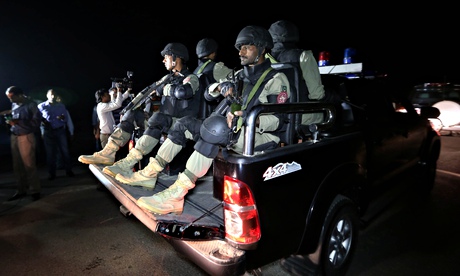
Pakistani paramilitary soldiers guard the road leading to the scene of the suicide bomb attack at Wagah. Photograph: Rahat Dar/EPA
A suicide bomber targeted crowds attending an iconic military parade on the Pakistan-India border on Sunday, killing at least 45 people and injuring more than 70.
The attack occurred as spectators were streaming away from a flag-lowering ceremony that takes places at dusk each day at the Wagah border post, an immensely symbolic and sensitive area 15 miles from Lahore, the capital of Pakistan’s Punjab province.
Among the dead were three members of the Rangers, a paramilitary force with responsibility for securing the area.
Punjab Rangers chief Tahir Javed Khan confirmed the attack was the work of a suicide bomber who detonated his device after apparently realising he would be unable to get through a security cordon without being frisked.
“The suicide bomber failed to cross the security barrier and blew himself up outside when people were coming out,” he said.
Had he succeeded in reaching the parade ground itself, where tiered seating accommodates hundreds of spectators, the death toll from a bomb thought to have been laced with ball bearings could have been even higher.
The daily spectacle sees soldiers on both sides stomping around in an elaborate display that culminates with the slamming shut of the double gates of the only land crossing between India and Pakistan.
The flamboyant display of nationalism attracts large crowds of onlookers on both sides of the border, including many families with young children.
Spokesmen from two nominally separate militant groups contacted news outlets to claim responsibility for the attack.
First, Jundullah, which has been linked to savage attacks in the past, said it had carried out the attack. Last year they claimed responsibility for the suicide bombing of a church in the north-western city of Peshawar.
But later the BBC said it had been called by the spokesman of Jamaat-ul-Ahrar, a group that recently split off from the Pakistani Taliban, costing the movement many of its top commanders.
In recent months the country has enjoyed a lull in terrorist violence, with far fewer mass-casualty attacks on soft, civilian targets than was the case in the previous year.
Analysts attributed the downturn in violence to the military operation launched in June against the militant safe haven in the north-west tribal agency of North Waziristan, and disagreements within the Pakistani Taliban that saw the once formidable militant alliance split into multiple groups.
Security forces are nonetheless on high alert as the country’s Shia minority prepare to gather in large numbers to mark the festival of Ashura which has been attacked by sectarian terrorists in the past.
Wagah is a particularly sensitive area for a country that has fought four wars since independence in 1947 with its larger neighbour.
With travel and trade between the two countries heavily restricted the daily flag ceremony is the only opportunity most Pakistanis and Indians have to see each other in the flesh.
Some pro-peace activists in Pakistan have criticised the noisy show of daily patriotism and have called for it to be scrapped.
Despite the hopes of prime minister Nawaz Sharif for an improvement in trade and diplomatic ties between the two countries, relations are currently at a low ebb after Delhi reprimanded Pakistani diplomats for meeting Kashmiri separatist leaders in August.
There has also been a dramatic escalation in cross-border firing between Indian and Pakistani troops on either side of the border in recent months.




